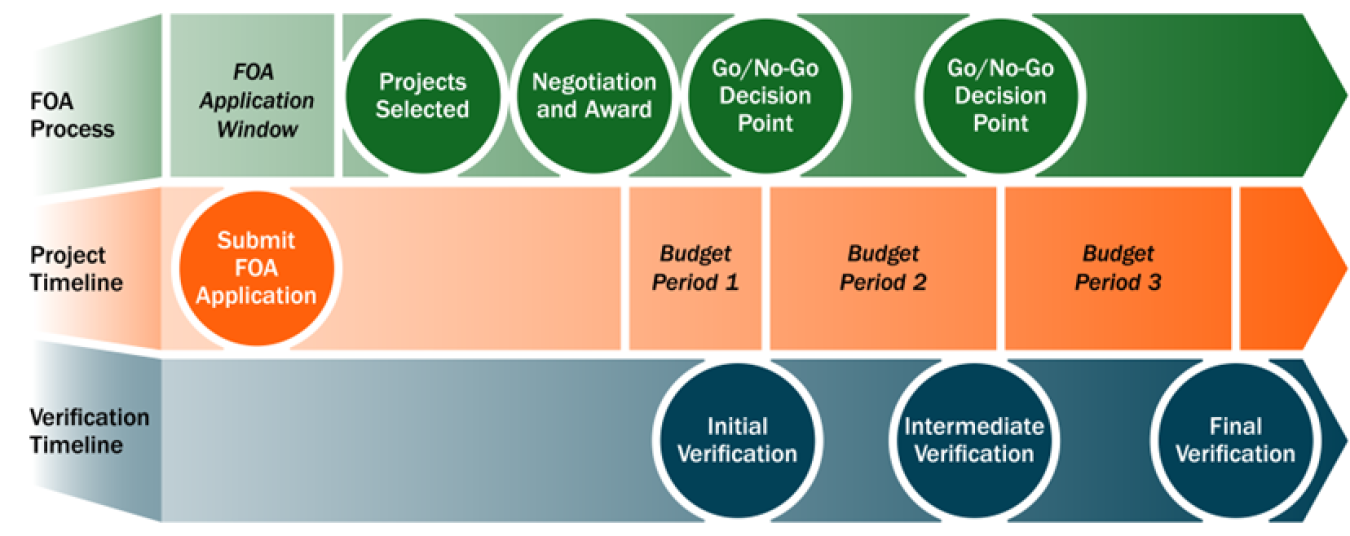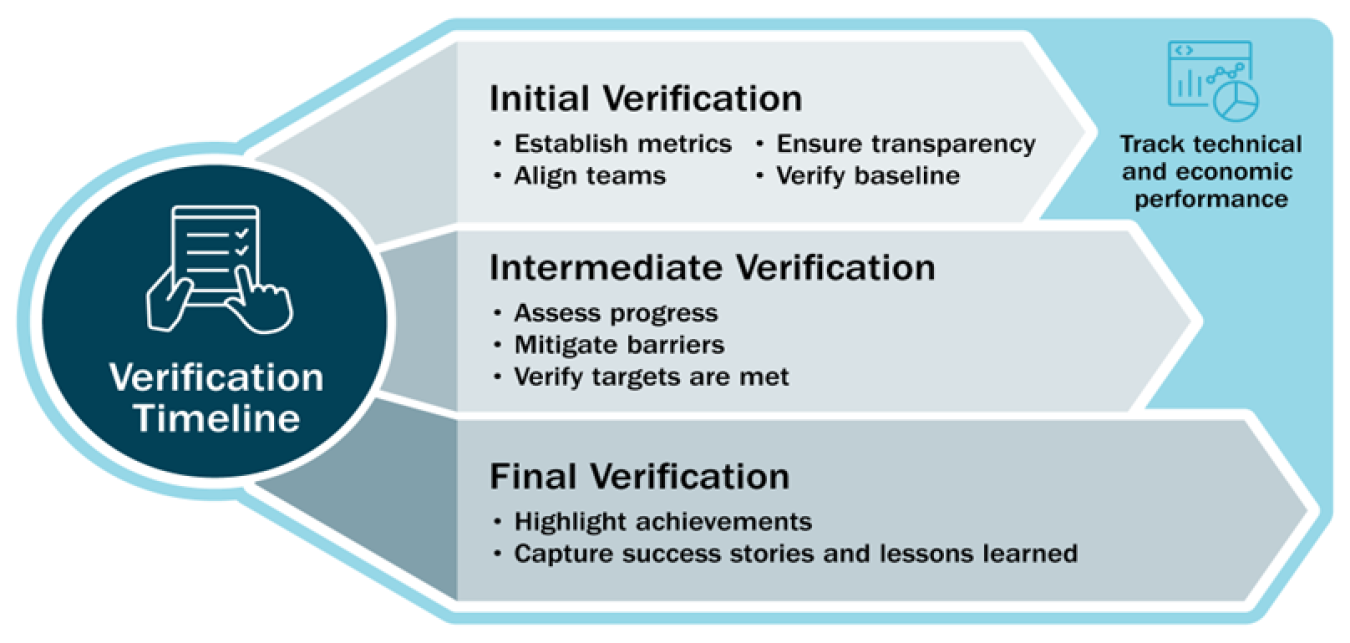The U.S. Department of Energy (DOE) Bioenergy Technologies Office (BETO) uses a three-phased process to verify chemical, biological, and thermochemical technologies for funding opportunity announcement (FOA) project awardees.
To prepare your application, see FOA verification requirements.
Process Objectives
Overall objectives of the verification process include:
- Clarifying and establishing the key project performance metrics that will be used to measure success
- Aligning goals, expectations, and desired outcomes of both the funding sponsor and the project team
- Increasing transparency between the project team and the funding sponsor
- Analyzing baselines, technical and economic targets, risks, and barriers for each project
- Proposing recommendations to strengthen the project as well as mitigation strategies to overcome barriers
- Comparing project performance to the current state-of-technology on a variety of technical, economic, and environmental dimensions
- Providing expert technical input to inform project management and portfolio management decisions.
Process Phases
The technology verification team follows a three-phased process, which includes initial verification, intermediate verification, and final verification. Successful completion of a phase is required for project continuation to the next funding phase.

Initial Verification: 1-3 Months After Initial Award Disbursement
The initial technology verification phase confirms the benchmark information provided in the FOA application and establishes the baselines from which future performance and cost improvements are evaluated. Objectives include:
- Establishing a common set of expectations between funding sponsor and award recipient team
- Validating original application information, such as baseline data, cost basis, process design, and sufficiency of personnel, facilities, and resources to perform the proposed work
- Validating project targets as well as assumptions and basis for these targets.
Intermediate Verification: 12-18 Months After Initial Verification
Intermediate technology verification is conducted near the conclusion of the second budget period and is aligned with project Go/No-Go decision points. This intermediate verification is used to assess progress relative to the intermediate performance and economic targets. Objectives include:
- Assessing progress toward the intermediate and final project targets
- Reviewing process design and economic assumptions for accuracy and relevance
- Reassessing sufficiency of project personnel, facilities, and resources to accomplish the proposed work
- Informing Go/No-Go decisions made by the funding sponsor.
Final Verification: Within 60 Days of Project End Date
If a successful Go or stage gate result was achieved after the intermediate verification, the project will enter the final budget period and a final technology verification is scheduled. Objectives include:
- Assessing progress towards achieving final project targets
- Finalizing updates of any process design and economic assumptions.

Phase Elements
Each process phase consists of three elements: (1) pre-verification, (2) an on-site or virtual verification meeting, and (3) post verification analysis and reporting.
Pre-Verification
Pre-verification work occurs before the on-site visit or virtual meeting and offers an opportunity to define the scope of work for the verification visit. Pre-verification work includes:
- Conducting an overview of the verification process with the award recipient team
- Working with all stakeholders to develop a verification requirements document specific to the project
- Scheduling the verification visit or meeting with input from all stakeholders
- Developing an agenda for the verification visit or meeting.
On-Site Verification
The data and experimental demonstrations during a verification meeting validate a project’s technical performance, process design, and economic analyses.
Technical Performance
On-site technical performance verification validates the baseline data provided in the FOA application by physically demonstrating the experimental approach and facilities that will be used during the project and reproducing the results. The award recipient team must:
- Demonstrate the process operations as described in the application and/or negotiated in the award
- Reproduce the application data when appropriate
- Submit a summary of experimental results upon completion of the data analysis.
Process Design and Economic Modeling
On-site process design and economic modeling verification validates the process design and economic data provided in the application. The award recipient team must:
- Demonstrate the techno-economic calculations and models described in the application and/or negotiated in the award
- Replicate the application data when appropriate
- Submit a summary of techno-economic results upon completion of the data analysis.
Post Verification Analysis and Reporting
The analysis results of each verification phase (initial/intermediate/final) for a project are reported via two methods: a synopsis and a verification report.
Synopsis
A synopsis is intended to quickly inform negotiations between the project team and the funding sponsor for the next budget period. This document includes key observations (including potential risk areas) and recommendations that DOE-BETO may consider in negotiating the scope and budget for the next budget period. The synopsis is provided within one week of completing the verification meeting and receiving all requested materials from the project team.
Report
An initial/intermediate/final verification report documents the results of the technical performance demonstrated or presented during the verification meeting, as well as the process design and economic assessments. Each of these reports is provided within 30 days after the completion of the verification meeting.
Technical verification topics included in the verification report include:
- Results from the demonstrated experimental work
- Observed technical variances
- Analytical techniques
- Standard operating procedures
- Discussion of risks, barriers, and recommendations for mitigation
- Project team capabilities
Techno-economic and lifecycle analysis topics include:
- Potential product market opportunities
- Selection of envisioned commercial-scale plant size
- Process overview
- Mass and energy balances
- Capital and operating costs
- Minimum product selling price calculations
- Greenhouse gas emissions and potential reductions calculated via established lifecycle analysis methodologies
Technical data and targets provided by the award recipient team are included in the verification report and kept up-to-date throughout the project timeline to serve as a point of reference and track progress.

